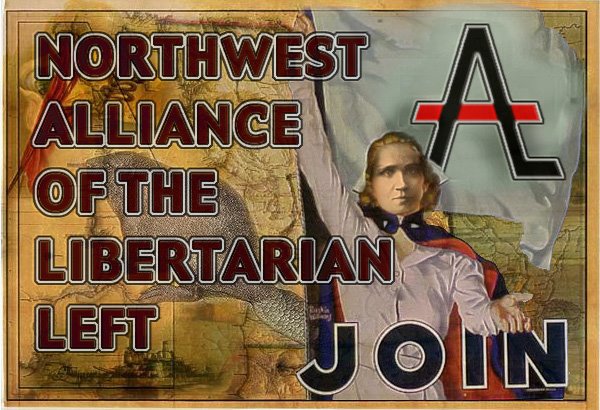Metropolitan secession
(Via Serf City 2008-01-31.)
Here’s something I mentioned some time back during a conversation about secession, decentralism, and decoupling the revolutionary doctrine of secession from the noxious notion of states’ rights
:
I mean, one kind of decentralist politics that you might endorse would be to advocate the secession of urban centers from the surrounding states and a decentralist order that's partly based on people forming a network of poleis around these urban centers. Certainly there are a number of cities (New York, San Francisco, Detroit, Austin, Atlanta ...) where enough people are disgusted enough with their state governments that this kind of idea might have some real traction. After all, the power of suburban and exurban and rural counties to lord it over cities through majoritarian control of the state government is, or at least ought to be, just as much a concern for decentralists as the reverse.
So it’s interesting to read that Peter Vallone, a City Council rep from Queens, was proposing something like that earlier this year–stressing, in particular, the way that Albany’s tax-eaters parasitically exploit the wealth that the City produces, and the futility of trying to make your voice heard in a majoritarian regime where you’re outnumbered and have no right of exit:
Emboldened by Mayor Bloomberg’s testimony in Albany this week that the city’s taxpayers pay the state $11 billion a year more than they get back, a City Council member is offering legislation that would begin the process of having New York City secede from New York State.
Peter Vallone Jr., a Democrat who represents Queens, is pushing the idea, and the Council plans to hold a hearing on the possibility of making New York City the 51st state.
I think secession’s time has definitely come again,Mr. Vallone, who spearheaded a similar push in 2003, told The New York Sun yesterday.If not secession, somebody please tell me what other options we have if the state is going to continue to take billions from us and give us back pennies. Should we raise taxes some more? Should we cut services some more? Or should we consider seriously going out on our own?During a visit to Albany this week, Mr. Bloomberg called on lawmakers to give the city its
fair shareof tax revenue and said that the state took in $11 billion more from New York City than was returned in the state budget. Mr. Vallone says that the state’s demands on the city in worsening economic times now make it necessary to dissolve the political bands, which have connected them.
Not only is it about self-determination and self-rule, but it’s about fairness,Mr. Vallone said.It’s something we see every year in the budget. They take $11 billion from us and give us back a mere pittance and they make it seem like they’re doing us a favor to give that pittance back. Somehow they missed the point that that is New York City’s own tax money and we deserve it.— Benjamin Sarlin, The New York Sun (2008-01-30): A Secession Plan Is Floated for New York City
Of course, Vallone is an elected Democrat, and like any politician, he takes a perfectly good radical idea and waters it down with stupid concessions to power: immediately after decrying the way majoritarian state government swindles people in New York City and denies them control over the fruits of their own labor, he goes on to propose that New York City ought to fix it by seceding from New York State, and then subordinating itself directly to the majoritarian rule of the United States federal government as the 51st state. I suppose there’s something to be said for cutting out the middle-man, but if you think that’s going to stop you from having billions taken from you and getting a pittance back, well, I have a fine bridge in the autonomous city-state of Brooklyn that you might be interested in buying.
And, like a politician, he proposes a stupid means to his stated ends:
Mr. Vallone’s legislation would create a commission to study the issue and then recommend whether to put it to a referendum. Since secession would have to be approved by the Albany legislators, its passage would be unlikely.
— Benjamin Sarlin, The New York Sun (2008-01-30): A Secession Plan Is Floated for New York City
The idea of holding a direct referendum is fine; but making that referendum contingent on a politically-appointed council of Experts is a waste of time and energy. If you want New York City to be free, begging Albany to let your people go isn’t about to work. You’ve got to just start talking with your people about getting up and leaving, whether Albany likes it or not. I mean, Christ. Supposing that you talked it up and got it organized and actually had enough people in New York City behind you, what are they going to do about it? Boycott Manhattan? Invade the South Bronx? Why wait on their permission?
The answer, of course, is that this is most likely half-sincere at best, and in large part an act of pointless political grandstanding by Vallone, which he would not be attempting but for the fact hat he can be sure it won’t go anywhere. But even if his plan won’t, it’s very interesting, and worth the attention of genuine secessionists and real revolutionaries, that a party hack from Queens figures there’s enough of that kind of sentiment in his neighborhood that he can exploit it for an applause line. And that other dissident city council members would be willing to endorse the same logic in the course of public political debate:
Another to council member, Simcha Felder, who chairs the Governmental Operations committee, said the bill will be considered this year.
It certainly has merit,Mr. Felder said of the proposal.Why in the world should New York City be held hostage to the state? It just doesn’t make sense.Mr. Felder acknowledged that the bill
would face many hurdles,but said it deserved a debate.
I think the people in New York City are very interested for the most part in it. The question is the people outside New York City in New York State who have been eating the fruits of our labor for all this time. They aren’t going to be ready to just say forget about it.— Benjamin Sarlin, The New York Sun (2008-01-30): A Secession Plan Is Floated for New York City
So don’t give them the opportunity. Why choose a strategy that requires you to wait on them to get ready for your freedom? If the people in New York City really are very interested,
then do what every successful independence movement in history has done: stop worrying about what the people who oppress and exploit you will say about it. Get talking, get organized, declare independence and then, if the state keeps trying to issue you orders, act like you mean it — by ignoring those orders and treating the people who issue them the same way you’d treat any other lunatic who thinks he’s Napoleon. Of course, a strategy like that is hard. Of course, it’s likely to fail. (Lots of independence movements have.) Of course, it will take years to organize and win even if it doesn’t fail. But it is a strategy that might possibly succeed, which puts it ahead of plans for having the city government petition the state legislature. And it’s also a strategy we can start talking about now. And talking about that may start a lot of other conversations that are worth having, about taxes, war, empire, and the rest.
New York City ALLies: how many people do you know who are very interested
in the idea of an independent New York City, which is no longer held hostage to the state? Remember that interest and sympathy and idle wishes are enough to start with: conviction and solidarity and organization are things that you can build by getting people to take the idea seriously, by educating them about it, by dispelling their ars, and by showing them that another City is possible. So, are there possibilities in doing anti-imperialist education, outreach, and, ultimately, organizing to free Occupied New York from the Empire State?
If so, let’s talk about how to do it. Maybe we can start in the comments here. Free the New York 8,274,527, and all political prisoners!


 For example,
For example,